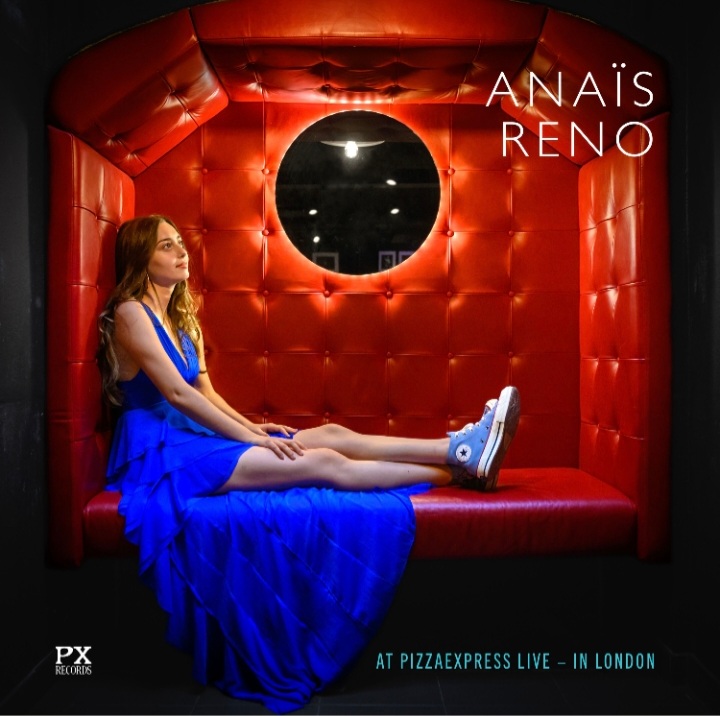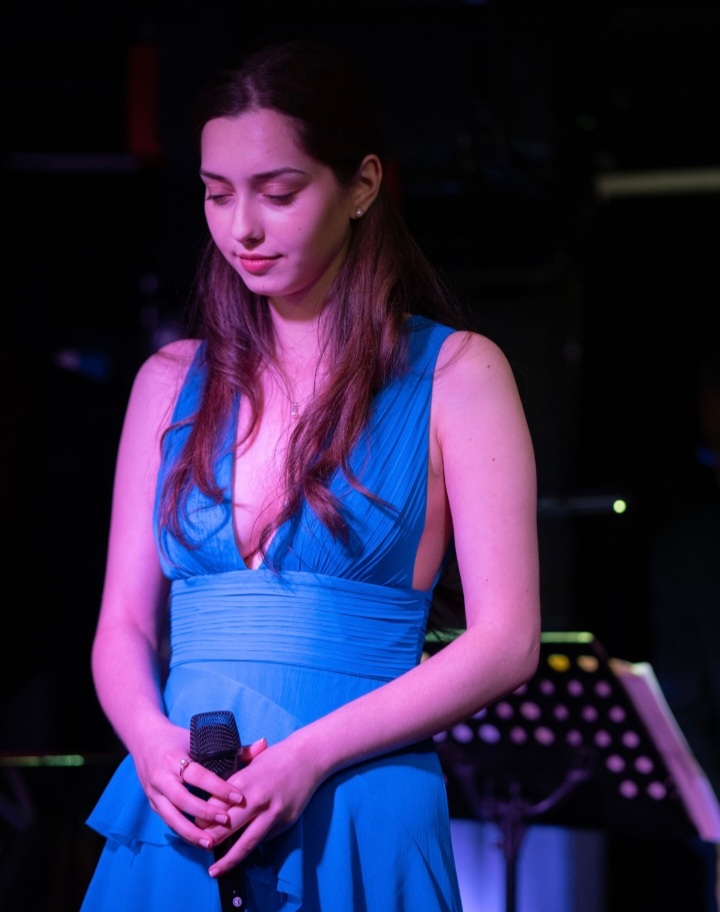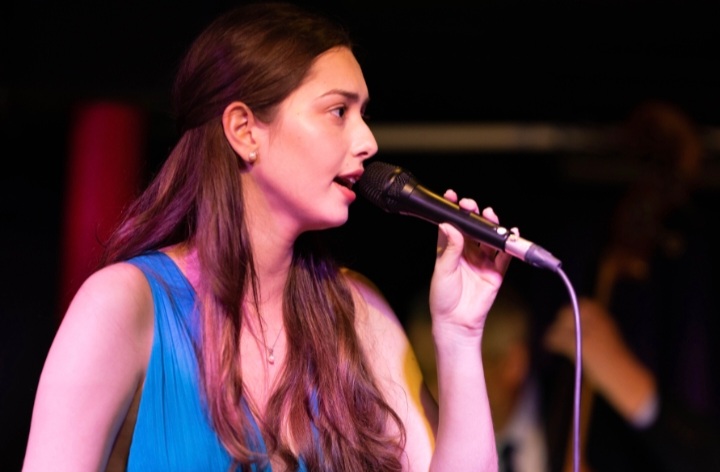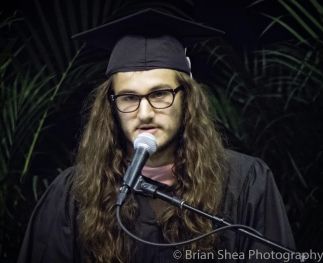The contemporary Jazz movement has been and still is highly active, thanks also to some new vital lymph brought by new inspired and driven young newcomers, especially in the last decade. More and more emerging artists from all around the world, year after year, are keeping the genre alive with such application, drive and inner talent, prone to move the genre towards the next century by putting their own personal stamp but still, without forgetting those significant sonic roots brought by many of the Jazz giants in the last century, being them either players or singers.
One of the rising stars in the contemporary Jazz World is, unquestionably, the 20-years-old American singer Anaïs Reno, an artist that has embraced Jazz in its entirety through studying it deeply throughout the genre's growth and consequent metamorphosis, revealing a vocal depth of great class and maturity already at a very young age.
The New York-based artist was born in Switzerland in 2003, with both parents involved in the music industry, with an opera singer father and a violinist mother. After moving to New York as a baby, Reno became actively involved in the performing arts at a very early stage of her young life and has had a rapidly growing career in recent years as a singer with a love for jazz and also for the Great American Songbook.
With a new album coming out in the next few days called At Pizza Express Live - In London, the first live album in Anaïs Reno's career and release by the record label PX Records, the American singer showcases once again her deep love for Jazz at 360 degrees, delving into the works of some of the greatest Jazz singers and composers, from Cole Porter to Duke Ellington or from Thelonious Monk to Charlie Parker, the whole delivered with effortless grace, elegance and impressive stage presence.

Our website meets Anaïs Reno just before the release of her very first live album, to discuss the making of said record and the inspiration behind it.
BR - Hi Anaïs, how excited are you about the release of your first live album recorded in London?
AR - I'm definitely excited, of course. About a year ago, I didn't imagine that it would have all happened in the way it did. It was a very new idea, in my world, to do a live album, I have done work in studio but that was a very different experience to record. Admittedly, I was very nervous about it, before doing it, simply because the atmosphere is so different. You get less chances at trying different things, but, having said that, I have always felt most comfortable singing when there is a live audience. They give me the adrenaline, they give you something to sing for, someone to look in the eyes of, when you are singing. That turned out to be such a beautiful experience so, knowing that has been captured in some way, it's really exciting.
BR - What are the most immediate memory that you have of the recording session of the album, back in the summer of 2023?
AR - That's a good question (pauses briefly). I remember, during the live performance and on one of the songs of the record called You're Nobody 'Til Somebody Loves You, something that it wasn't disruptive in any way, but somebody in the audience, when we started that song, went "Haaaa" (smiles). It seemed that he probably knew the song and maybe had some sort of affiliation for it. It was not super noticeable, in that moment and you can hear it, in the recording. It's not very loud, but it's stuff like that that I think really separate the feeling from doing a studio record from a live performance. That's the experience and I always grin when I listen to that moment, it was so funny! And whoever that was, I appreciated it very much (smiles).
BR - You just mentioned the album's setlist and we were wondering, given how eclectic is the choice of the songs included on your live album, what was the process that you followed when the time came to decide which song was going to be included on the album?
AR - I'm very obsessive over setlists. Sometimes it is honestly problematic for me to have several months to prepare, because then I revise and repeat and think way too much about it. I'd say I try my best not to have many repeats of the same theme or energy, with songs and if I do, I try of course to separate them enough, on a set. This live album was also an interesting experience because of the way in which the songs were performed. It was during two 40-minutes sets, which is a very particular layout that I honestly hadn't done before, in a club. In some ways, it can be difficult to wrap my mind around it, because on one hand, there is the same audience watching both sets, so you can't get too repetitive but, on the other hand, it's easier, because you kind of have two closers and two openers in the same performance and there is some kind of natural separation, between the two sets. With something like that, I wanted to make sure that each set felt like its own product and had its own variety. I think that, with this record, I tried also to get out of the mindset of what is cool to sing that is a deep enough cut, in the world of Jazz, to include; I tried to simply think what do I like, what do I enjoy singing and that's why there are quite a few popular songs, on the album, such as Girl From Ipanema, a song for which a lot of people in the Jazz community would roll their eyes over doing. But the reality is that I like to sing that song, therefore, why not singing it? It's as simple as that. Of course, there are a couple of more obscure songs as well, on the live album, simply because I enjoy listening to different albums of different artists and picking out the ones that speak most to me. And those might not always be the most famous recording from said records, but it wasn't the purpose, of including everything. It was rather a matter of what feels right to me, what feels joyful to sing, what's gonna be joyful to hear.
BR - Do you recall whether there was any of the songs included in the album that was particularly challenging for you to sing, in terms of being truthful to the originals sang by great masters of the genre, like Billie Holiday or Ella Fitzgerald, for example?
AR - It's De-Lovely was a hard one to nail. It was easier to figure out where that song would go, on the setlist, that was going to be an obvious opener to me but, vocally and stylistically, that one was a little bit of a process for me. That one and Yardbird Suite actually, I'd say, because both songs have a similar quality of moving quickly, being wordy, jumping all over the place and yet, because of what they are both saying, you have to sound relaxed and have to sound like you have thought about this before. Which is its own lesson to learn, in itself, for any musician but, if you are looking at it from a singer's perspective, being able to express the words in a way where each sentence feels individualistic without rushing over it, even though it moves quickly, that's not always been my forte. But I wanted to work on it for these songs, because I enjoyed the potential that they would add to the record. And it feels to me that was worth it (smiles).
BR - Can you tell us a bit more about your choice to include Pannonica, one of Thelonious Monk's compositions, into the setlist of the album and whether that tune has got a particular significance for you, besides, we guess, you being an admirer of Monk has a Jazz Master?
AR - Of course. First of all, just musically speaking, to put it simply, the song is truly stunning. It has a very unique melody. It almost feels as though is in two keys at once, which is a rarity, with these kind of things. In my repertoires, I tend to sing songs that are very clearly of one particular tone but, from a lyrical level, I love music that is written from the prospective of admiring someone from afar and almost feeling an ache over the fact that you can't reach it. There's a lot of songs with the same lyrical pattern, like, for example, in Billy Strayhorn's catalogue, where he is admiring some person that he compares to a flower (A Flower Is A Lovesome Thing), which is so romantic and gorgeous of a thought and Pannonica has a similar idea, because Monk didn't write the lyrics, so the piece assumed a new life, once the lyrics were added to it. That spoke to me, because I am a big fan of nature, metaphors and the idea of personifying things that we see in the world. To have heard that so deeply engrained in that song, it really spoke to me and that is why I wanted to include Pannonica in the setlist.
BR - We were fascinated by all the different aspects of Jazz, as a genre, that you touched upon on the record, choosing to include songs of great crooners such as Dean Martin or Frank Sinatra together with lesser known cuts, still of great beauty and so perfectly delivered by your splendid voice. Was there a particular singer that worked has a sort of role model for you, when you grew up and started to be fully immersed in your love for Jazz?
AR - Of course, there are actually a few, to be honest. For example, Sinatra, who you just mentioned, he was a big influence for me. The way that he swings and the way that he delivers a song is unlike any thing that I have heard from anybody else, to these days. He's truly a marvel and there are endless things to learn from him. I love Carmen McRae too. I've talked about this before, in the last few years and on other interviews but I'm gonna say it again, because I cannot shut up about it how much I admire this quality of hers. The way that she annunciates the lyrics is almost Shakespearian to me. I went to acting class, in High School, I am by no means a professional actress and something that I particularly enjoyed learning, that was influential to the way that I hear the lyrics, was coming from Shakespeare and how a lot of words in the English language actually sound like what they mean, in some way. If you just isolate the way that the consonants and the vowels line up with each other, maybe they don't line up perfectly well but to me, in some way, that also contribute to the meaning and I can't help to wonder whether Carmen had something like that in mind, when she was interpreting music. I do get that feeling every time I hear her singing and I do feel that's why everything she sings sound so poignant and to the point. I love a lot also Bill Henderson. There was a song in my live album, called At Long Last Love that I was inspired to do because of his recording of it, because he swings so hard and there is so much joy in the way that he sings anything, but particularly those happy Cole Porter's tunes. He's just amazing. So, I'd say, those are The Big Three, for me, amongst many others.
BR - Your growing popularity, as an artist, is growing fast in UK and the rest of Europe almost at the same level that it does in the United States. How different, in terms of audience, are British and overall continental audiences different from American ones?
AR - That's an interesting question. I think, in general, the differences that I noticed, especially in the UK audiences, it is the fact that they come across as more relaxed than the American ones. In America, in a lot of areas, (and this is a huge generalization because of course, not everybody is this way) we are not as chilled as, say, a British audience may be. Just to give you an example, originally, the recording of this live album was supposed to happen at the end of May last year but, because of some health related reasons I was dealing with at the time, I had to postpone it. When we sent the email about this delay to the guys at Pizza Express in London, I was so nervous that this delay was going to be a huge inconvenience for them and the concert so difficult to reschedule. I am sure, in the end, that it wasn't going to be a massive inconvenience, to some extents, but they were nevertheless so understanding and relaxed about it, by just telling me "Yes, sure we can reschedule for July, no problem". Needless to say, I was taken aback by the reaction and thought "Oh, my God, how was that not a big deal?" Having said that, I don't wish to imply that America doesn't have its own convenient way to deal with things like that. It's just very different, in terms of pace, such as here in the US, all would be dealt at a much faster pace, while in places like the UK, it all feels a lot more laid back and relaxed. I guess that you can hear it in the music too and the musicians, where America's musical rhythms go pretty much towards the fastest BPM that you can possibly imagine, while in the United Kingdom, it's a lot more chilled. It's not that I wish to make comparisons, such as one place is better than another. It is solely a matter of pace and, I guess, the ways in which audiences show their appreciation too.

BR - We are aware that both your parents are involved in the music industry. In that respect, have you ever felt, at a very early stage of your career, any pressure on you coming from them at any point or were they solely a highly supportive presence for you?
AR - Before I started singing, I didn't feel any pressure from them, because I was only six! (smiles). Also, within our family, I was the only one doing Jazz, while both my parents are more classically trained, therefore I wouldn't say that there was a push to specifically pursue this genre. I'd say that, when you grow up in New York City and you show any level of attitude for anything at a young age, it's not just even about the parents, but it's more about your environment in general that can push you to try and be as successful as possible as young as possible. To sum it all up, I'd say that, overall, I have been certainly given the space I needed to make my own decision.
BR - Do you still remember the first time you fell in love with Jazz, Anaïs?
AR - It happened gradually. I don't think it was a One Moment One Day kind of situation. When I was 8-years-old, I started training with a voice teacher and she thought that the Jazz genre would suit my voice and my sensibilities. Do you know, I can't believe that we have now known each other for 11 years, wow.. I'd say that, over time, it just felt a normal progression to me, artistically speaking. I didn't even realize that was happening, at first, it just became what I actually sing. And I stuck with it.
BR - Going back to your live album, we are sure you have planned an extensive Tour to support the release of the record and we were wondering whether the Tour will be touching solely the whole of the United States or you have plans to tour Europe and the United Kingdom too.
AR - I am gonna be going on a little Tour in Europe and, of course, the UK specifically. I think we have already planned a couple of shows in London at the Pizza Express again, later in July this year. While I shall be promoting the live album during the course of the Tour, I feel that for the time being, my focus will be more on touring Europe, more than the States. It's really about bridging together the two sides of the pond, for me, right now, because I love Europe, especially London, so very much.
BR -Anaïs, for somebody like yourself that has embraced music already at a very tender age, specifically Jazz and studied it in all its different sounds and forms, how much do you feel that the meaning of the word Jazz has changed during the last 4 or 5 decades and what does Jazz means to you, personally, as an artist?
AR - It's so interesting that you ask that, because there were talking about that very same topic in one of my classes, a little while ago. It seems that, in a lot of ways, Jazz changed much more rapidly and holistically in the first forty to sixty years of its existence than it has in the last 20 years. While many people have found their own more modern adaptation of it, I find that we all have this very high regard for the legendary musicians who pioneered it and who started whatever is inspiring us now to change further. It's a huge privilege to be able to study Jazz and I say that because, if you are able to put down money and take a risk on something like that, financially and take four years of your young adult life to study this music, which is inherently no longer something that pays millions of dollars a year typically, that is indeed a huge privilege, a huge safety net. Back then, when they were pioneering this music, they weren't aware, I assume, that they were creating something new. It's just the way they thought about the music and then, it just happened to be recognised as something new, by the greater public. It truly came from within them. There was no option or something else to fall back on, they just loved it that much and thought about it that deeply that that risk, it was their only option. Because it felt natural, I guess, to them! Therefore for us, to study that, is a major privilege. Through the years, I sense that the stakes have become different. I am privileged enough to be in a place where if I, for some reason, fell flat on my face, in my Jazz career, I would still be able to go home and have family who can take care of me. Of course, it would suck to realize that was the place I came to, but it would be possible. That was not always the case for everybody, but they were still doing what they loved. I think that the sound has changed a lot too, as a consequence of the fact that it's just a very different environment, now. It's a lot more gentle and I think that, in a lot of ways, it is a great thing. I think you can have a better relationship with music, if it's not all that you live for, but it also means that the sound can be different, depending on who you are talking to. For me, Jazz has changed, in my head, for the past few years, by being in college and meeting more people and working with more musicians. I think it used to be very all or nothing for me, but now, I understand that Jazz is even more beautiful because it integrates itself in our lives and viceversa. You don't need to be obsessing over something, in order to love it and in order to have it as a part of your life. That aspect makes living with Jazz a more healthy experience for me and more enriching to sing too, because you realize that your own life experiences are influencing what you are creating. I think anybody would tell you that. I was told that I had to embrace that mentality many years ago, but it wasn't until I started college and understood the importance of it that started to internalize itself, for me.
Photos courtesy by John Lyons


